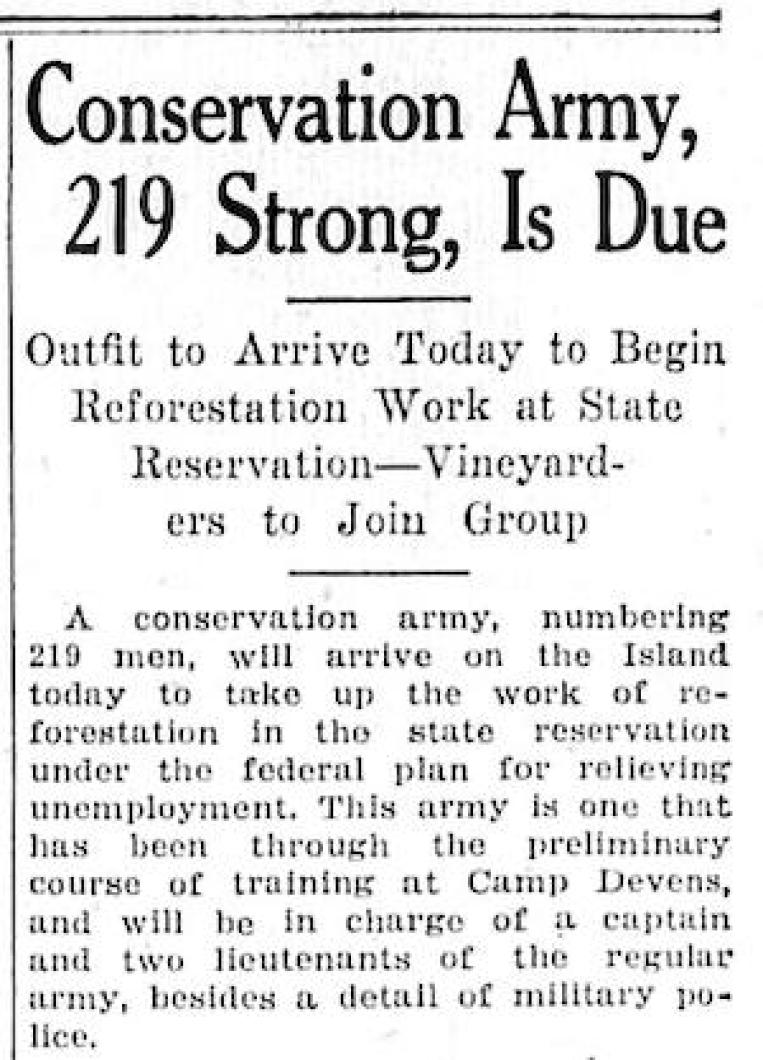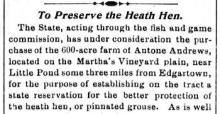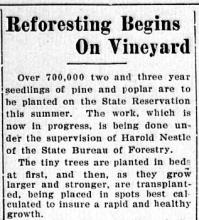A conservation army, numbering 219 men, will arrive on the Island today to take up the work of reforestation in the state reservation under the federal plan for relieving unemployment. This army is one that has been through the preliminary course of training at Camp Devens, and will be in charge of a captain and two lieutenants of the regular army, besides a detail of military police.
The outfit is to encamp under canvas at first, on the state forest reserve, and is to be augmented by an allotment from the Island towns. The Island men are to be chosen, sent to Camp Devens for physical examination, and then returned to join the Island detachment.
Major S. A. Lester of the regular army visited the reservation on Friday, to pick out the camp site and arrange for the driving of wells for the fresh water supply. The major mentioned the possible erection of four or five barrack buildings 120 feet in length to house the men later on, as the program is expected to last through the summer at least.
Sanderson to Direct Work
The work will be directed by L. B. Sanderson, superintendent of the reservation, and will consist of cutting new fire stops, improving those already cut, building roads and developing all water holes. Some forty tons of equipment, including 16,700 pounds of food, 38,657 pounds of equipment, 14,000 pounds of tentage, and 10,000 pounds of baggage, will be used on the reservation, and the general plan indicates that the summer will yield results that would require many years of work with the normal personnel employed there.
The detailing of this force to the Vineyard was effected through the efforts of Rep. Ernest J. Dean, who is thoroughly familiar with the work of reforestation by the state, and was quick to take advantage of the opportunity to speed up the program of planting the Great Plain with useful trees, as well as to secure employment for some of the Island men. The process of securing this detail has been a lengthy one, but the last arrangements were hurriedly made and little information had been received on the Island up to the first of the week.
It is understood, however, that these camps are operated on a semi-military basis, with strict regulations governing the activities of the men, and that camp conditions are similar to those required in the regular army. So that, regardless of the number or type of men in any outfit, it is not at all likely that any disturbance to surrounding inhabitants may be expected.
Information received by Mr. Sanderson indicates that married men of the prescribed ages are eligible for employment, but that if they are enlisted into the personnel of the conservation army, they will be required to live in the camp as the single men will do.
Superintendent Sanderson said that these men will not plant trees on the reservation unless the program of work extends into the fall, the season when planting is done.
Promptly upon the decision to send a detachment of the conservation army to the Vineyard, the state Department of Forestry communicated with Hollis A. Smith of Vineyard Haven, urging him to take a position as director of the work. Mr. Smith has studied in all branches of forestry, and has previously been in the employ of this and other states. However, as the work could not, of necessity, be of long duration, Mr. Smith declined to sacrifice a permanent position for the one offered by the state.
Blanks and requests for bids on groceries, vegetables and meats were received by Vineyard grocers on Tuesday. The quantities to be supplied are large, and include almost all staple groceries, and all varieties of meat and fowl.
Major Eames from the surgeon general’s office visited the Island, on Tuesday, taking samples of water obtained from the wells driven on the state reservation, and making arrangements to care for sick or injured men should the need occur. The U. S. Marine Hospital at Vineyard Haven will be utilized in the event that such facilities are necessary, and Dr. O. S. Mayhew has been appointed camp doctor for a month at least.










Comments